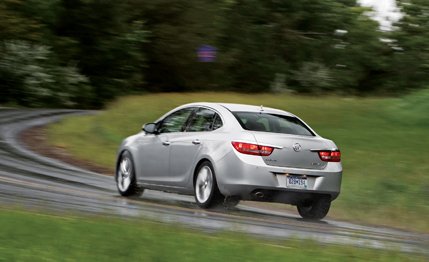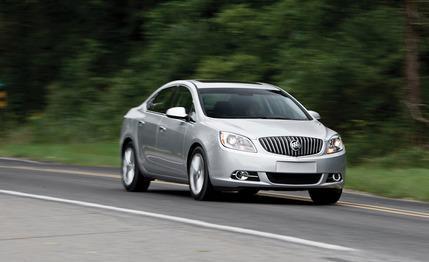 Short Take Road Test
Short Take Road Test

If you’ve been keeping up with the reading, then you’ve probably noticed that the old Buick is dead. GM’s 2009 quick-rinse bankruptcy purged the pipeline of big softy sedans for Florida blue hairs who cruise with a permanently flashing turn signal. Today’s Buicks are smaller, firmer, and international in scope. With Pontiac, Saab, and Saturn gone from the fold, Buick finally has the elbowroom and resources it needs to thrive.
Think of the Verano compact sedan,due in showrooms by the end of the year, as the new Buick’s poster child. Its mission is to take the pain out of small-car, high-efficiency driving. And while it shares GM’s “global compact vehicle” (formerly known as Delta II) architecture with the Chevy Cruze and Volt, other than basic size, there’s no hint of family resemblance. Most of the exterior sheetmetal and chassis tuning came the long way through the GM hierarchy—from the Opel Astra.
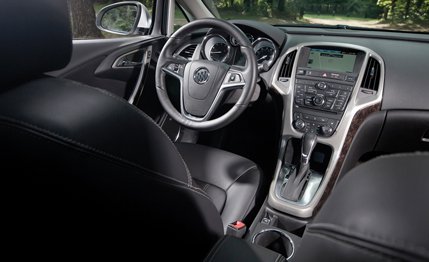
But like the Cruze, the Verano will lead a frugal life with no more than four cylinders under the hood. Its 2.4-liter Ecotec engine cranks out a humble 180 horsepower delivered through a six-speed automatic transmission. What that powertrain lacks in 0-to-60-mph hustle—a task that takes 8.2 seconds—it makes up in gas mileage. Out of the box, the Verano clears the crucial 30-mpg hurdle with 31 mpg expected in the EPA’s highway test and 22 in city driving.
And the Verano is blessed with creature comforts the Cruze lacks, such as softer interior trim, simu-wood paneling, dual-zone automatic climate control, and push-button starting and parking-brake actuation. Small quarter-windows brighten the interior by day, and blue cockpit lighting uplifts the mood at night. Options include heated leather seats with contrast-color stitching and Buick’s IntelliLink system, which connects a smartphone via Bluetooth or a USB cable to the standard seven-inch LED screen. Communication and entertainment functions can be controlled by touch, voice, or steering-wheel–button commands.
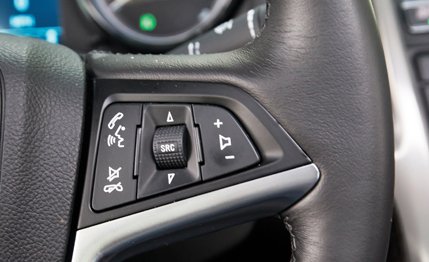
Considering the Verano’s price range—from $23,470 to $28,545 for our loaded test car—there are a few bits of equipment that missed the cut. Lowly manual controls adjust the driver’s backrest angle and all of the front-passenger seat’s movement. There are no rear-seat HVAC registers. And the split-folding rear seatbacks can’t be released from the trunk.
But give Buick engineers credit for treating noise, vibration, and harshness as the evil troika it is. Cavities have been stuffed with sound-deadening material, both sides of the dash are insulated, the windshield and side glass are laminated, and a set of underbody panels blocks rain sizzle and tread noise. Five tuned chambers subdue the engine’s induction roar. As a result, the Verano goes beyond library quiet to achieve the peace and tranquillity of a vacant coal mine. Versus two targeted competitors—Acura’s TSX and the Lexus IS250—the Verano is two decibels quieter during cruising (68 dBA) and three to six decibels quieter accelerating (72 dBA).
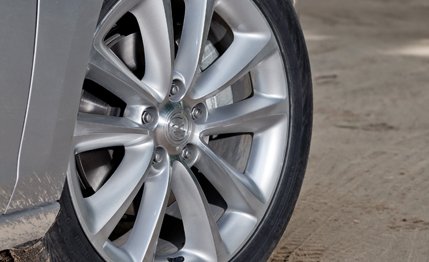
Unlike past Buicks, gains in comfort don’t sacrifice dynamic poise. The feel through the Verano’s steering, suspension, and mostly high-strength–steel body structure is distinctly Germanic. There’s enough spring, bar, and damper to restrain body motion even as hints of road feel come through the electrically assisted steering. While the 0.86-g grip we measured on the skidpad and the 21 mpg we observed are not much to brag about, at least the suspension calibrations combine resilience—allowing wheels to patter over broken pavement—with the resolve to snub float. Four-wheel disc brakes collaborating with Continental 235/45R-18 four-season radials mounted to forged aluminum wheels stopped our test car in 175 feet with little hint of fade.
This chassis could easily handle more horsepower. Buick has acknowledged that a second gentleman of Verano is on the way. Sometime next year, the Regal’s turbocharged 2.0-liter engine—packing 220 horses and 260 pound-feet of torque—will join the options list. Hope it’s soon.
